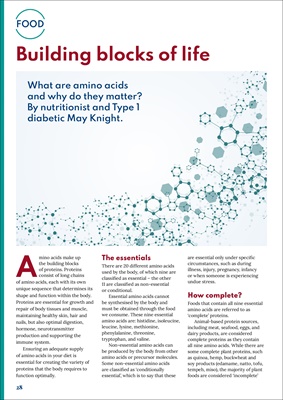
28
FOOD
Building blocks of life
Amino acids make up
the building blocks
of proteins. Proteins
consist of long chains
of amino acids, each with its own
unique sequence that determines its
shape and function within the body.
Proteins are essential for growth and
repair of body tissues and muscle,
maintaining healthy skin, hair and
nails, but also optimal digestion,
hormone, neurotransmitter
production and supporting the
immune system.
Ensuring an adequate supply
of amino acids in your diet is
essential for creating the variety of
proteins that the body requires to
function optimally.
The essentials
There are 20 different amino acids
used by the body, of which nine are
classified as essential - the other
11 are classified as non-essential
or conditional.
Essential amino acids cannot
be synthesised by the body and
must be obtained through the food
we consume. These nine essential
amino acids are: histidine, isoleucine,
leucine, lysine, methionine,
phenylalanine, threonine,
tryptophan, and valine.
Non-essential amino acids can
be produced by the body from other
amino acids or precursor molecules.
Some non-essential amino acids
are classified as 'conditionally
essential', which is to say that these
are essential only under specific
circumstances, such as during
illness, injury, pregnancy, infancy
or when someone is experiencing
undue stress.
How complete?
Foods that contain all nine essential
amino acids are referred to as
'complete' proteins.
Animal-based protein sources,
including meat, seafood, eggs, and
dairy products, are considered
complete proteins as they contain
all nine amino acids. While there are
some complete plant proteins, such
as quinoa, hemp, buckwheat and
soy products (edamame, natto, tofu,
tempeh, miso), the majority of plant
foods are considered 'incomplete'
What are amino acids
and why do they matter?
By nutritionist and Type 1
diabetic May Knight.